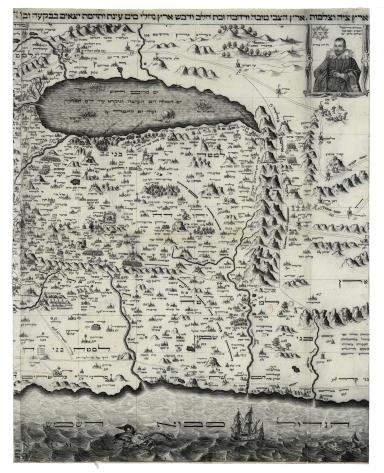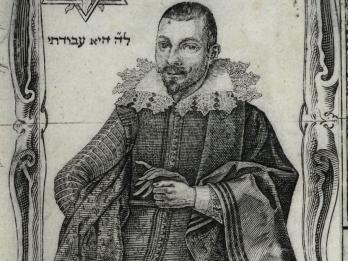Sermon: On the Holy Land
Jacob ben Abraham Tsaddik
Isaac Karo
Beginning of the 16th Century
The three problems that I first asked are explained in regard to all of that which I have said. The first: Why is it called the “Holy Land” and the “Holy Temple”? This is according to the fact that it gives a sense of completeness to Israel in both life and in death; in life: prayer, wisdom, and prophecy; in death for the body and for the soul: resurrection and atonement, and the straight path on which the soul walks in straightness under the throne of glory. In regard to the second problem, they asked: It was also possible to do these things in a different place and in a different land; then why did the Lord, may He be blessed, choose the land of Israel more than the other lands? The answer is that this is according to the fact that the land of Israel is the heart of the world,1 and the heart gives life to the entire body, and it is the king of the body. Thus, the heart is called king, for the king needs to be in the center of the kingdom.
And if you should ask, “From where do you derive that the land of Israel is the heart of the world?” The answer is that the entire world is like one man and the Garden of Eden is the head of the world, for the intellect is in the head. Indeed, the Tree of Knowledge is in the Garden of Eden, and thus, it is the head. The land of Israel is the heart, and Egypt is the nakedness (i.e., the genitalia), and in this regard it is said: You have come to see the nakedness of the land (Genesis 42:9). Greece is the legs, for they are ugly. The land of Israel is in the center of the world, and the heart is in the center of the body; and if it is so, then the land of Israel is the heart, and it gives life to the entire body. Thus, God chose the land of Israel according to the fact that it is the heart, for the brain contains knowledge, but it does not give life to the body; the vital force is in the heart and not in the brain, and for this reason the Lord chose it. Moreover, the Lord chose the land of Israel according to the fact that the foundation stone upon which the world was founded is there, and it was fitting for the Lord to choose that very place. In addition, within this answer is contained the first answer, for since the world was founded upon it, it is like the heart that is born first and dies last. So too all of the limbs are at first sleeping, and the heart is the last to do so. This is the meaning of the verse: I am asleep, but my heart is awake (Song of Songs 5:2)—that is, I have not even begun to sleep, and now the limbs have begun to sleep, but the heart is still awake. It is also awakened before the limbs, when they are awoken from their sleep. For this reason, the land was given to the people of Israel, for they are the heart of all of the peoples of the earth.
Indeed, in the Zohar, a non-Jew asked R. Eliezer, “You Jews do not eat nonkosher food so that you will be healthy, but you are weaker than all of the nations. Moreover, you say that you are close to the Lord, but those who are close to the king do not experience sorrow, but you are in a state of greater sorrow than all of the nations” [see Zohar III:221a–b.]. R. Eliezer answered that all of the other nations are the limbs of the body, while Israel is the heart; and the heart takes the fine and the good and the clean parts of the blood, and the chaff of the food is for the limbs [see b. Bava Batra 45a; Kuzari 2:36]. For this reason, Israel is weak. Since Israel is the heart and the other nations are the limbs, Israel is in the center of the world, like the heart. Thus, the gentiles are afflicted with tumors and with psoriasis and with vitiligo, but Israel is not, for the heart is not subjected to skin disease. It is for this reason, too, that Israel is in sorrow, for the heart knows and understands and feels the body, but the body does not know. Thus, the body does not feel sorrow, as does the heart. According to the fact that Israel is the heart, and it is impossible for the limbs to live without the heart, the world cannot exist without Israel. This is the meaning of the verse: Who is a great nation, etc. (Deuteronomy 4:7). Thus, we say that the Lord is the heart of the world of the angels, and He is also the heart of all of the worlds. The sun is the heart of the world of the spheres, and thus it is a sphere, like the heart; and the land of Israel is the heart of the lower world, and the people of Israel is the heart of all of the nations. And since the people of Israel is the heart of the nations, the heart of all of the lands was given to them. Behold, the two difficulties have been explained. The first: What does the land of Israel have more than the other lands that it is called the “Holy Land,” and the “Holy Temple,” etc.? Behold, we have explained that this is because it is conjoined with the Lord in both life and in death. And the second difficulty: Why is this conjunction greater in regard to this specific land than in regard to all of the other lands? This is because it is the center of the world, and it is like the heart that is in the center of the body. This is also because of the fact that there exists the foundation stone from which the world was founded.
Credits
Published in: The Posen Library of Jewish Culture and Civilization, vol. 5.





